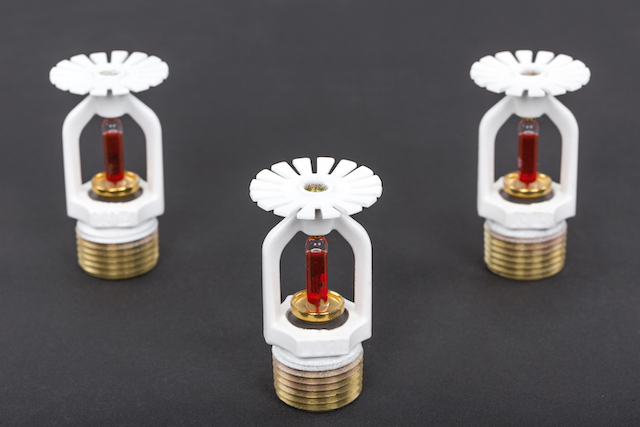
Fire suppression systems are vital for preventing the spread of fire and protecting valuable business assets.
As a property owner who cares about fire safety, you know that fire suppression systems are vital for preventing the spread of fire and protecting valuable business assets. However, you might be wondering – if the fire suppression system goes off while someone is in the room, will the person be hurt at all? The real answer is that it depends on which type of system you have. Here are some of the most common kinds of fire suppression systems that are safe for people within your building.
Water
For many buildings and kinds of businesses, a water-based suppression system (or sprinkler system) is the bare minimum requirement for fire suppression and code compliance. Water isn’t inherently harmful to people. However, it’s also not the most effective kind of suppression system for every circumstance. In some instances, water can be more dangerous in the presence of certain types of fires than other available extinguishing agents. It can also cause horrible damage to your property or equipment, requiring substantial cleanup.
Gaseous Cleaning Agent Systems
There are three common categories of gaseous clean agent fire suppression systems. These are inert gas, chemical clean agent, and carbon dioxide systems. Each type has unique properties that might lend themselves well to differing fire types.
Inert Gasses
Inert gasses such as nitrogen, inergen, and aragonite are very useful fire suppressants. They can put out fires by smothering them, displacing, or reducing oxygen. Usually, water ends up causing more harm than good to the property, such as in server rooms or around any electrical equipment. Inert gasses are ideal for situations where valuable or sensitive equipment needs to be protected.
Carbon Dioxide
Carbon dioxide fire suppression systems are perhaps the oldest of the clean agent systems out there. CO2, as its usually referred to, has been used in systems since the early 1900s. It’s inexpensive compared to other clean agents and can be used in total flooding or local application. The downside, though, is that carbon dioxide extinguishes by displacing oxygen and, in some instances, can create situations that can be instantly hazardous to personnel within the building. Therefore, it is not typically used for total flooding in occupied areas. When it is used, it is subject to several safety considerations. Carbon dioxide is used for industrial local application systems where the safety risks are manageable.
Chemical
Chemical clean agent systems are like the inert gas systems in that they also discharge and disperse out a gas. They provide extinguishment through heat absorption and leave no residue, which means no additional equipment damage. These fire suppression systems are less hardware intensive and cost less for installation.
Fire Protection Services from Fireline
Whether you need smoke detectors, fire extinguishers, or an automatic sprinkler system installed at your commercial property, Fireline has you covered. We have been protecting people and property from fire damage since 1947—and our experience shows in our excellent work! We are known for our superb customer service, our expertise, and our reliability. For more information on how we can help your residential or commercial property, visit us online or give us a call at (800) 553-3405. We are located in Baltimore, MD, with a second office in Leesburg, VA. For more fire safety tips, be sure to follow us on Facebook, Twitter, and LinkedIn.
